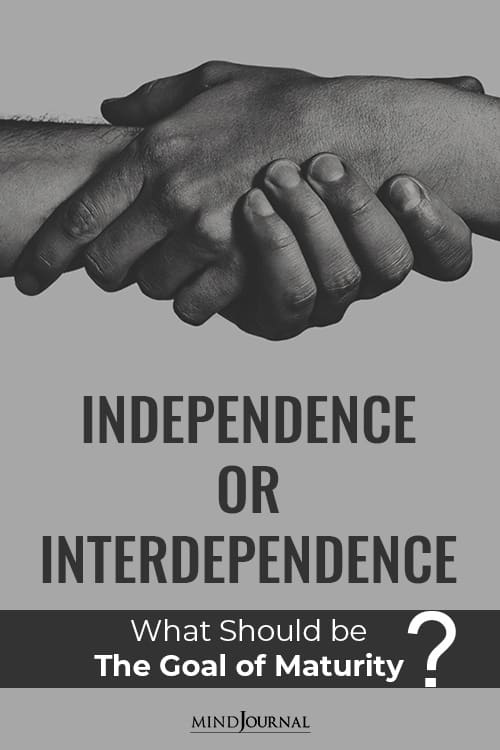Living with one’s parents, or choosing to live alone and independently. Which option equates to the goal of maturity in an individual’s life?
When is a grown child independent and why do we want them to be? Outside of the United States, most cultures see interdependence as a more harmonious, mutual way to live.
It’s conventional wisdom that independence is not only a benchmark of adulthood but also the goal of psychological development. But that may be changing. There is an important generational difference in people’s perspective of what independence means and how it is accomplished.
Baby boom parents, especially those over 60, believe that independence is the culmination of a series of stage-specific, external accomplishments, ranging from finishing schooling to starting their own families and, of course, living on their own. By contrast, most of their 20 and even 30-something kids define independence as an inner, self-defined state of mind, characterized not by their immediate circumstances but by a sense of autonomy over their own choices and decisions and freedom from parental authority (except as it limits some choices).
And where they live or who pays all or some of the bills has nothing to do with it. They are validated by their peers and, increasingly, the ‘truthiness’ of true believers of all stripes—I feel it, so it must be true.
Related: 5 Rules For Living With Your In-Laws (and Making It Work)
Matt, at 24, is the first to label himself independent, despite the fact that he lives in his childhood room, avoids making any commitments beyond the end of the month, is still on his parents’ health and auto insurance as well as their cell phone plan, and has difficulty balancing the combination of part-time work and part-time school without oversight.
And many like him, even those who’ve successfully made the move out of the family home are still dependent on their parents for other kinds of support, usually emotional, but also instrumental; Lila, 26, is a lawyer who can’t decide what to wear for work without texting her mother pictures of several possibilities. And almost annually, there’s a “trend” piece in the business press about “Take Your Parents to Work Day” or an article on parents who accompany their grown kids to performance reviews or sit in on their job interviews.
But outside of the Western world, as German psychologist Heidi Keller notes, interdependence rather than independence is the goal of psychological development. It describes how most families in Europe and Asia live—parents and grown children together under one roof, sometimes with their parents and their kids as well.
Family compounds are not unknown, and you don’t need to be rich to live in one. Interdependence is a psychosocial concept that sees closeness as the key to all relationships; it has long been an important concept in family systems, although its application in young adulthood has not been as well studied.
But interdependence is increasingly being viewed as an alternative endpoint to maturity. This is an important distinction, reverberating through social science, lifespan psychology, cross-cultural studies, and developmental theories. It’s also particularly germane to consider now, at a time when over 35 percent of 18 to 34-year-olds in America, across all income levels still live with their parents: In Italy, courts have found that even self-supporting adults, like their 30-year-old lawyer son who brought the action, have a right to remain under the family roof!
Interdependence may be a natural outgrowth of the boomers’ parenting style, which stressed relatability, emotional openness, and an attempt at greater authenticity with its kids; how they feel—their happiness—is more important than what they accomplish. Its key dynamic is mutuality, which is the characteristic most associated with well-functioning households where two or more generations of adults live together and establish a template for the continued coherence of the family. There’s something in it for everyone; companionship, affection, support, help of all kinds, an antidote to loneliness.
Related: 10 Common Mistakes That Therapists Make When Counseling Estranged Parents
“Just being there to give or get a hug, especially on a bad day,” one parent reports. “Help with the top half of the sandwich, my own mother,” says another. “I can afford to live on my own, but why should I? Here I’m surrounded by people who love me and care about what happens to me. That’s rare in many lives,” says a 28-year-old daughter, a teacher who lives at home “by choice, not a necessity.”
Many parents, who report “a comfortable reliance” on their grown kids, report that it’s not as one-sided an arrangement as its often made out to be. “It’s not take, take, take by any means. If they weren’t contributing, I’d feel differently.”
For a generation that professionalized parenting to an unprecedented degree—that always wanted to be the kind of parents their kids would choose as friends even if they weren’t related—it’s a win-win situation. Interdependence is an idea whose time and place has come.
Written by Jane Adams
Originally Appeared In Jane Adams
Even though there is always going to be a debate regarding which living style is equivalent to the goal of maturity, living with your parents does have many benefits, and not just financially. Ignoring the emotional factors that come into play, and the fact that the relationship between parents and children get deeper when they live together under the same roof is not at all fair. The goal of maturity can still be a possibility if you live with your parents.










Leave a Reply